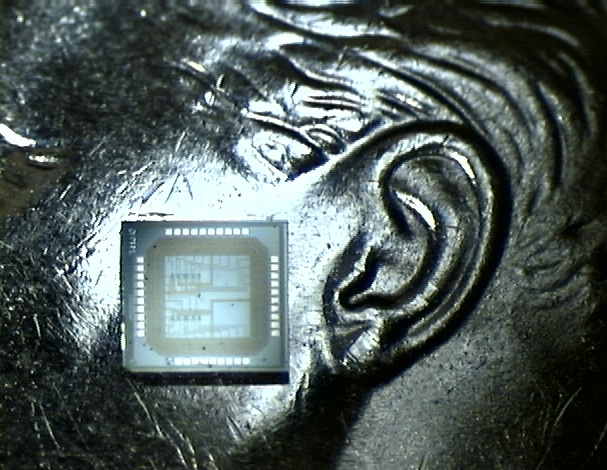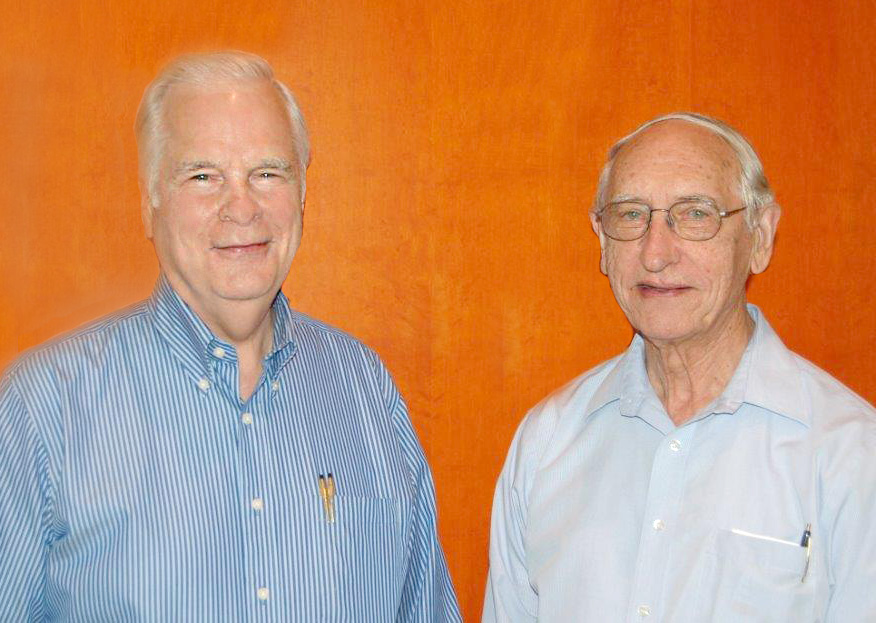
The Texas Biomedical Device Center at UT Dallas develops technology like this ultra low-power wireless neural interface chip, shown on a U.S. dime. The device is used for digitizing, amplifying and sending cortical implant data to an external computer.
The Texas Instruments Alumni Association recently pledged $250,000 to support the Texas Biomedical Device Center’s mission to develop and advance medical devices and therapies to improve the lives of those who have suffered neurological injuries.
The gift will establish a distinguished professorship and fund pre-clinical and clinical research for the treatment of brain injuries, including clinical trials this year at UT Southwestern Medical Center. One trial will focus on the treatment of tinnitus, while another will look at motor recovery after stroke.
The TI Alumni Association (TIAA), a volunteer organization of Texas Instruments retirees and former employees, is raising funds from its members through its TIAA Legacy Fund campaign. The association serves an ambassador role in the community through travel, education and volunteer activities, and by maintaining connections and interests in the people and business of Texas Instruments. More than 100 members of TIAA — including several UT Dallas alumni, staff retirees and professors — attended the group’s annual meeting on campus last week.
“Our organization wanted to do something that would leave a legacy, and we felt that we could accomplish that goal through the excellent research being conducted at UT Dallas,” said Max Post, the association’s vice president of activities. “TI and UTD have always had a strong, productive relationship; we are proud to continue that tradition by supporting studies of great benefit to our members.”

Larry James (left) is incoming TI Alumni Association president, and Max Post is the association’s vice president of activities. The association held its annual meeting at UT Dallas last week.
TI’s founders, Eugene McDermott, Cecil Green and Erik Jonsson, also created the research institution that became UT Dallas in 1969. The founders wanted to create an “MIT of the Southwest” — an academic and research engine that would fuel the economy.
TIAA’s gift will be counted among donations to the University’s Realize the Vision: The Campaign for Tier One & Beyond. Donors recently surpassed the campaign goal of reaching $200 million in gifts and pledges for students, faculty research and programs vital to UT Dallas’ quest to become a Tier One research university. The five-year campaign will continue through its scheduled end on Dec. 31.
“We’re enormously grateful for the forward-thinking contributions by the TI Alumni Association and its understanding of the importance of biomedical research to the future of Dallas and the United States,” said Dr. Robert Rennaker, director of the Texas Biomedical Device Center and head of the Department of Bioengineering.
“Our organization wanted to do something that would leave a legacy, and we felt that we could accomplish that goal through the excellent research being conducted at UT Dallas.”
Max Post,
TI Alumni Association’s vice president of activities
The Texas Biomedical Device Center was established at UT Dallas in 2012. Faculty members from the School of Behavioral and Brain Sciences, the Erik Jonsson School of Engineering and Computer Science, and the School of Natural Sciences and Mathematics contribute to the center’s interdisciplinary research efforts to create new biomedical technology and therapies.
By fostering interactions between researchers at UT Dallas and clinicians and investigators at UT Southwestern Medical Center, the device center creates an environment for biomedical engineering innovation and opportunities to integrate the teaching, research and clinical missions of both institutions.
To support the TIAA campaign, please contact Anna LeBlanc at 972-883-6023 or anna.leblanc@utdallas.edu.